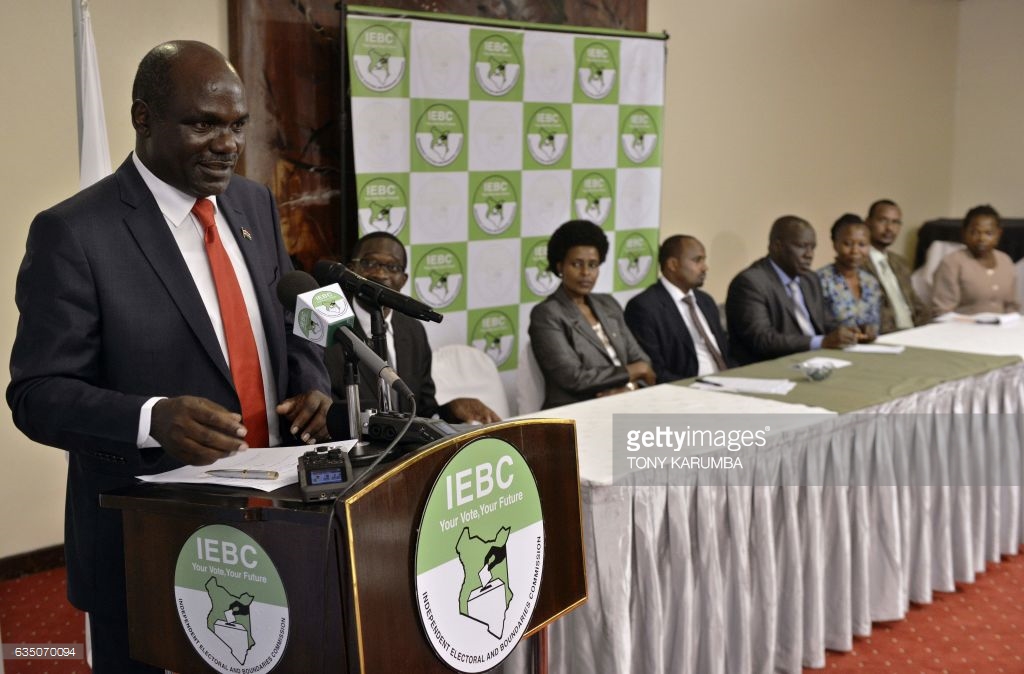Kenya must call off repeat presidential election

Less than a week to the repeat presidential poll, the country is dangerously polarized. The leading opposition candidate has withdrawn. A senior official of the electoral body quit and fled the country, saying conditions for a credible poll have not been met. The elections chief has said the same thing.
The International Center for Policy and Conflict (ICPC) is calling upon the Independent Electoral and Boundaries Commission (IEBC) to exercise its constitutional powers and call off the fresh presidential election planned for October 26, 2017.
Under Article 88 of the Constitution of Kenya 2010, the superintendence, direction and control powers of the preparation and conduct of all elections are vested in the Commission. It must invoke these powers and call off October 26 elections. Election Commission must set and provide satisfactory conditions to all parties to have a level playing field in strict observation of the Supreme Court of Kenya decision.
It will be suicidal to the country to proceed with an election that has a deep deficit of credibility, inclusivity and integrity. It will be tragically reckless for the IEBC to hold an election in highly polarized toxic environment both ethnically and politically. It can only conduct an election in such an environment if its objective is to plunge the country into civil war.
Democracy being the basic feature of Kenya’s constitutional set up, there can be no two opinions that free, credible and fair election alone would guarantee the growth of a healthy democracy, stability and human security in the country.
It is fundamental, therefore, to note that when elections are credible, free and fair, they promote democracy, human rights and security. But when elections are fraudulent, they trigger political instability. Thus, for democracy to fulfill its potential as a means of peacefully resolving social and political conflict, the integrity of elections is cardinal. Election with integrity produces a government with a legitimate authority to govern. The electoral process leading to the Election Day must enjoy the highest degree of confidence among all Kenyans. It is currently enjoying the least level of public confidence, legitimacy and trust.
It is remembered that the late chair of defunct Electoral Commission of Kenya was prevailed upon not to announce the winner in a highly contested 2007 presidential election but he failed to listen, with serious consequences. It will be an unforgivable mistake to repeat a similar fate. Thus, IEBC must abandon the October 26 presidential election and seek a structured dialogue consensus that leads to holding of an election in accordance with the direction of the Supreme Court of Kenya when it nullified the August 8, 2017 election.
In nullifying the election, the Court ordered IEBC to conduct fresh election in accordance with Article 140 of the Constitution, which it proceeded to disregard and opted for Article 138. IEBC was expected to hold fresh election starting with fresh nominations of the Candidates. This is consistent with the Constitution and laws governing conduct of the election.
However, IEBC has messed up the entire process of holding fresh credible elections by sidestepping crucial legal requirements and procedures. There is also withdrawal of a candidate from the election on basis that IEBC has completely failed to respect and hold election in accordance with the direction of the Court and Constitution. It is foolhardy to go on with an election where a candidate commanding almost half the country is excluded.
At the moment President Uhuru Kenyatta is holding temporary incumbency for the simple reason that his exercise of the delegated sovereign power from the people of Kenya for the period of constitutionally set Five year term has expired. He does not enjoy the consent of the people of Kenya to govern and run the government of Kenya on their behalf.
It is unfortunate that the Jubilee Party candidate Uhuru Kenyatta does not seem to distinguish presidency from his candidature. There has to be an effective sanctioning mechanism against the misuse of state resources, including administrative and security apparatus for the level playing field, during the election period. This includes the limiting of the role of the government during the election period as strictly limited to caretaker functions.
The Constitution has set out clearly provisions for temporary incumbency with limited functions during the election period so as to guarantee credible election and succeed in instilling public confidence in the electoral process and results. The temporary government core mandate is to oversee the conduct of election and to serve until a new government is democratically elected and formed in accordance with the Constitution of Kenya.
Finally, it is important that in this pre-electoral period, the rule of law and human rights is respected and that the State respects Constitutional provisions in order to build truly inclusive and resilient constitutional democracy, the foundation for durable economic and social development.
* NDUNG'U WAINAINA is Executive Director, International Centre for Policy and Conflict.
* THE VIEWS OF THE ABOVE ARTICLE ARE THOSE OF THE AUTHOR AND DO NOT NECESSARILY REFLECT THE VIEWS OF THE PAMBAZUKA NEWS EDITORIAL TEAM
* BROUGHT TO YOU BY PAMBAZUKA NEWS
* Please do not take Pambazuka for granted! Become a Friend of Pambazuka and make a donation NOW to help keep Pambazuka FREE and INDEPENDENT!
* Please send comments to [email=[email protected]]editor[at]pambazuka[dot]org[/email] or comment online at Pambazuka News.
